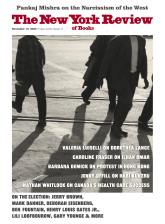Chaos has a cognitive cost. Many of us understand this at some level, having strained to function normally for months now in a jerry-rigged approximation of normal life. But what we haven’t known, because I’m not sure it’s possible to know it, is that all this coping along multiple axes—financial, social, educational, medical, environmental, political—has side effects whose dysfunctional aspects we cannot yet see. We are busy with first-order matters: doing our jobs, if we have them, in strained and suboptimal circumstances, feeding our families, and helping children through improvised schooling scenarios almost no one has well in hand. Keeping out the smoke, if you live on the West Coast. Evacuating for hurricanes, if you’re in the South. And if you’re doing the “right thing”—staying home in an effort to stop the spread of Covid—you might see the crowds acting as if the normality you miss exists and feel that yours has been a pointless as well as thankless sacrifice.
Add to this that nothing is stable, that there seems to be no hope for relief or recovery, and no one seems to be treating any of it like an emergency. We’re witnessing a long, slow, pointless, unacknowledged collapse while the Trump White House manufactures grievances and new details come to light, again and again, of the administration’s corruption, dishonesty, incompetence, and malice.
Put simply, we have not been able to pause, or take stock, or mourn. I don’t know if “trauma” is the right concept for what we’ve endured together, but to the extent that the word is defined as an inability to process a distressing event in the moment, it seems to qualify. More than 220,000 people have died of Covid in this country. Alone and unseen, many vanish without funerals or memorials to honor them. And there has been no national recognition or collective observance. We have had to keep pedaling desperately, trying to avert collapse, while the losses mount, ignored.
That the president cannot adequately acknowledge the dead (beyond saying “it is what it is”) is a tragedy because, in this sense at least, he matters, terribly. It is the task of a leader to integrate our losses into a larger story. As a nation, we have certain traditions and rites to mark shared grief—flags at half-mast or a moment of silence to publicly mourn the dead—but the Trump administration has decided to forgo any markers of this kind. The Democratic National Convention came closest to offering such a thing. Being virtual, it allowed people from all over the country to talk about their experiences and commiserate about their losses. Unusually for political theater, it left room for sadness. For that reason it was strangely cathartic.
In the meantime, citizens have had to endure lie after insulting lie. That many of us have learned to see through this should be a good thing; a skeptical citizenry is certainly better than the alternative. But many of us have come to reflexively distrust official channels and institutions on which we used to depend and on which we need to depend: it is hard to overstate the damage the CDC and the FDA suffered when Americans watched them cave to political pressure and change their recommendations, betraying the public to suit the president’s desires.
Conspiracy theories thrive in this climate. QAnon has become a disseminator of improbably popular and truly unhinged conspiracy theories on the right. The left has nothing comparable, but it does suffer from a hypercorrective impulse that sometimes reads too much cunning into Trumpian dishonesty: when Trump’s Covid-19 diagnosis was finally reported, thousands of people openly wondered whether it was genuine, and what (if it wasn’t) the strategy might be. Many respond “and you’re surprised?!” whenever news of some fresh Trumpian horror drops; it’s a reflex that suggests we are medicating hopelessness with a know-it-all jadedness and mistaking cynicism for control.
The good news (for now, and it’s probably fleeting) is that something has changed. The coronavirus outbreak in the White House has been a nightmare for a host of civic reasons: that the president was ailing while the Joint Chiefs of Staff quarantined and his advisers convalesced was suboptimal! But since news of Trump’s diagnosis broke, I have sensed a kind of cognitive relief among progressives that is only partly attributable to dislike of the man. For people who treaded water while the president denied it was wet, it has been valuable to see reality assert itself against its most virulent detractors.



